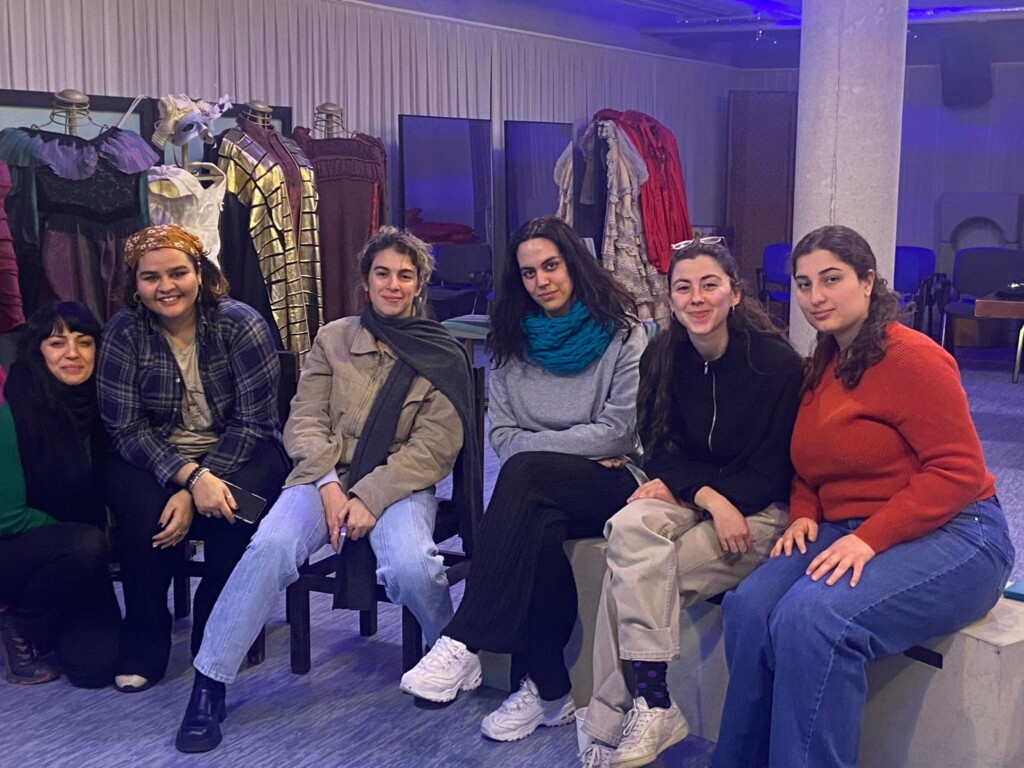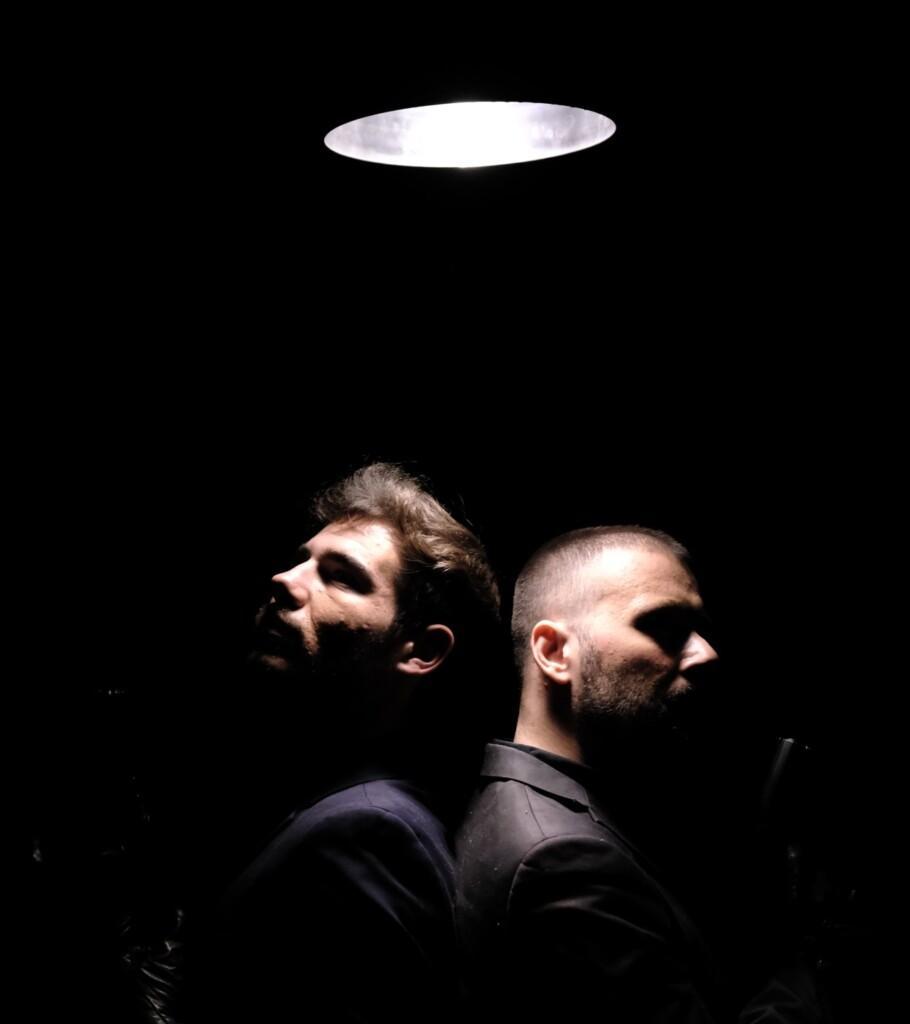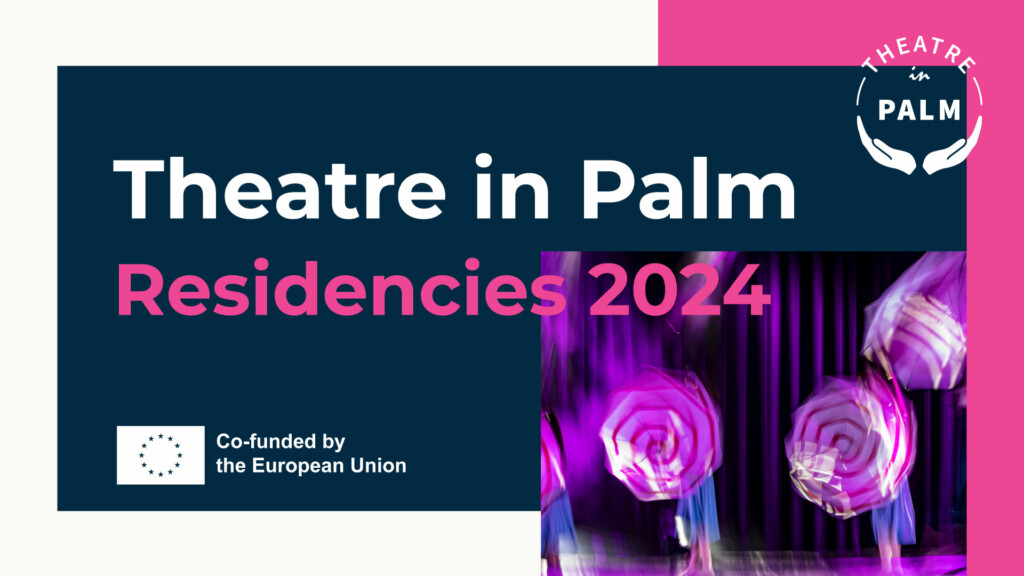TIP in Cyprus: Bridging borders through digital theatre – Testimonials from the Theatre in Palm Residency

The digital residency, organized by the Cyprus Theatre Organisation (THOC) as part of the Theatre in Palm project, provided artists with the opportunity to explore new ways of working remotely, breaking down geographical boundaries and fostering innovative collaborations. Below are the testimonials of the artists who participated in this unique experience, sharing their insights on the challenges and creative outcomes of the project. The digital residency took place on 6-10 February 2023.
In the photo: Cyprus Digital Residency group, from left Marina Makri, Syeda Farwah Rizvi, Sophia Mavromichali, Rafaella Neophytou, Nefeli Kentonis, Maria Pishili
Marina Makri
Actress & Mentor
In a residency project, where one is invited to stay in a space with the goal of producing an artistic outcome, this specific project had a unique feature: the internet. A place without a place, it doesn’t abide by the principles of space, anarchic. However, it has now been established as “the space.” Over the past two years, we have become quite familiar with communication platforms (Zoom, etc.), but this fact still causes me great sadness. Not psychologically, but psychogeographically. It’s cramped. A narrow space, like a narrow mind, causes discomfort because movement, flow is missing— for example, when screens freeze, when there is no sound, and all the related issues we all have experienced and know. The flow is interrupted. It freezes. Fortunately, in this case, I was proven wrong, and I like when that happens because these moments of discomfort were the most constructive. We got to know people from twelve different countries, partnered with Ireland, and had to create communication bridges to reach a final outcome. The benefits were many, but if I had to choose one thing, it would be the union of minds, which resulted in flow, play, and joy. Elements without a place and anarchic, like the internet. I also remember the readiness of every team member to reject or sacrifice personal ideas for the sake of the team. What I would like to explore further is Antigone’s stance in relation to her duty, in relation to Maria, Martha’s sister, as described in the Gospel.
Syeda Farwah Rizvi
MA Theatre Arts Graduate
My experience collaborating with the Cypriot creators within the Theatre In Palm program was truly refreshing. This was mainly due to the element of challenge embedded in the process of devised theatre, which made the working environment genuinely creative. Moreover, the technological aspect of the project—the virtual/digital collaborations—and the final presentations revealed extremely important possibilities, which will undoubtedly benefit and rejuvenate performance creation practices in the future.
I believe that both the Cypriot and Irish teams felt the need to make an authentic statement regarding the challenges presented to us—Antigone and the issue of environmental responsibility—and all of us wanted to create a work that expressed our frustration with the current situation. It was interesting to see how the starting point was approached with the same intention by both countries, which helped us complement each other’s ideas in a balanced way.
It is always exciting to work within a successful collaboration, which I personally define as a thorough representation of all ideas. In this case, I believe we were fortunate to share the same visions. Additionally, despite our limited timeline, I was able to learn a lot from my colleagues. It was a space of freedom and inspiration, where we could generate ideas, test them, keep or discard things depending on the need of the moment. I think this is a fantastic way for artists to keep their instincts sharp, alive, and creative.
In conclusion, I believe this experience taught me how many possibilities exist in the digital realm, and I would certainly like to continue experimenting further with it.
Sophia Mavromichali
Set Designer/Costume Designer
An unprecedented experience for most of us, the digital residency of Theatre in Palm gave us the opportunity to explore the various ways in which an artistic collaboration can function remotely. The nature of this initiative—namely, the idea of creating something together with artists located abroad—aligned with the rapid advancements in technology, is indicative of how international collaborations could work in the near future.
For me personally, this experience proved that the use of technology indeed has the power to eliminate distance and create opportunities for new forms of collaboration. Through this specific experience, I realized that a limitation can very easily turn into an advantage. The restrictions that emerged through dialogue—in our case, between our team and our Irish counterparts—activated our thinking and imagination on another level.
I learned to allow new ideas to emerge without getting stuck on previous ones and to trust the process without worrying about the final result. The exposure to the ideas and work of young artists from such diverse parts of the world has undoubtedly enriched all of our minds.
In the future, I would like to see if this approach could lead us to a more complete final result, one that could be presented to a wider audience.
Rafaella Neofytou
Actress/Performer
My experience in this first residency of Theatre in Palm was certainly pleasant and, at the same time, creative. As an emerging actress, I believe that the opportunity I was given to collaborate with professionals in the field, to form a beautiful team, and to achieve a creative outcome with our final project could only be described as positive. Each person contributed their ideas and uniqueness, enriching the team spirit. We faced interesting and diverse tasks in this project. By working as a team (with the local team) and interactively with the team from Ireland, we took the artistic and collaborative spirit one step further.
Certainly, through such projects, we learn, evolve, and improve both as a team and as individuals. We constantly give and receive from others. The residency gave us an additional reason to remain open to this flow, to this movement. My collaboration with other creative and wonderful people definitely enhanced my communication skills, as we had limited time to work and produce something based on a specific theme.
Our collaboration with the team from Ireland provided us with an insightful view of their culture. We discovered similarities between the two cultures (Cyprus-Ireland), something that both teams utilized for our final project. The residency is a key pillar for implementing new perspectives and expanding the network of young artists, while undoubtedly offering fertile ground for personal growth.
I firmly believe that the opportunity to collaborate with international teams can bring emerging artists from across Europe closer together and further strengthen what we love to do as artists, making us even more productive and creative. In future residencies, it might be constructive to focus on major issues of our country and Europe overall, through the diversity of theatre and the very structure of the residency.
Maria Pisiili
Actress/Performer
The first digital residency of Theatre in Palm left me with mixed feelings. This is because, while it was a very beautiful and constructive experience, it was also short in duration—it lasted only one week. During the residency, our team had the opportunity to collaborate with the team from Ireland to create a performance. After a period of isolation due to COVID-19, when most artists did not have the chance to work in person, this program, because of its nature, provided us with tools to create performances through various online platforms.
At the same time, we had the opportunity to use objects and materials that were readily available in our environment, even from nature itself, which is particularly helpful for teams that are just starting out and lack budgets or spaces to present their work. Personally, I feel grateful for this experience, which provided me with inspiration and stimuli for my personal growth, as well as the opportunity to collaborate with different people, especially regarding their artistic identity, with whom we may work together in the future.
Through this program, I would have liked us to explore further, over a longer period, how these small presentations could develop into performances that might be presented to an audience, either in person or online. It would also be interesting if the pairs of teams formed during the residency could maintain communication or even collaboration in the future.
I look forward to Theatre in Palm’s next initiatives. In closing, I would like to thank Ms. Marina Maleni, who oversaw the program, our team mentor, Marina Makri, and Nefeli, Rafaella, Sofia, and Farwah, with whom I shared this experience. Michael, Robert, Niamh, Ro, Jess, and Féilim—thank you for the wonderful collaboration.
Conclusion:
The digital residencies have provided an invaluable platform for creative exchange and collaboration. These testimonials highlight the transformative impact of working across countries and using digital technologies, which opened new avenues for artistic creation and personal development. The residency has fostered a deeper connection between emerging artists across Europe, encouraging innovative ideas and practices that will continue to shape the future of theater and artistic collaboration in the digital age. We look forward to the ongoing evolution of this initiative and the exciting opportunities it will bring.



